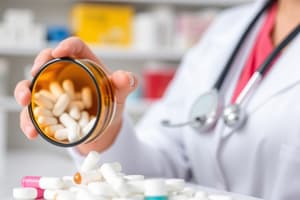Podcast
Questions and Answers
What is the main goal of drug therapy?
What is the main goal of drug therapy?
- To ensure drugs are only used for recreational purposes
- To provide maximum benefit with minimum harm (correct)
- To create new diseases through drug interactions
- To eliminate all risks associated with taking medication
Which of the following properties is considered the most important for an ideal drug?
Which of the following properties is considered the most important for an ideal drug?
- Cost-effectiveness
- Selectivity (correct)
- Potency
- Effectiveness
What does the term 'pharmacology' refer to?
What does the term 'pharmacology' refer to?
- The study of drugs and their interactions with living systems (correct)
- The study of anatomy and its relationship to health
- The study of chemical reactions in non-living systems
- The study of human psychology
What is a common misconception about drug safety?
What is a common misconception about drug safety?
In clinical pharmacology, what is the focus of study?
In clinical pharmacology, what is the focus of study?
What is the primary goal of nursing practice regarding medication administration?
What is the primary goal of nursing practice regarding medication administration?
Which concept encompasses the rights and responsibilities of nursing practice?
Which concept encompasses the rights and responsibilities of nursing practice?
What is the significance of the Controlled Substances Act in nursing?
What is the significance of the Controlled Substances Act in nursing?
What characteristic is NOT typically associated with drug therapy objectives?
What characteristic is NOT typically associated with drug therapy objectives?
What is a key aspect of continuous learning in nursing related to medications?
What is a key aspect of continuous learning in nursing related to medications?
Which pharmacokinetic process involves the way a drug is eliminated from the body?
Which pharmacokinetic process involves the way a drug is eliminated from the body?
Which DEA Schedule includes drugs with the highest potential for abuse and are ILLEGAL in the USA?
Which DEA Schedule includes drugs with the highest potential for abuse and are ILLEGAL in the USA?
What does pharmacodynamics primarily focus on?
What does pharmacodynamics primarily focus on?
Which of the following medications is classified as Schedule II according to the Controlled Substances Act?
Which of the following medications is classified as Schedule II according to the Controlled Substances Act?
What role does patient adherence play in drug responses?
What role does patient adherence play in drug responses?
Which statement about pharmacokinetics is correct?
Which statement about pharmacokinetics is correct?
Study Notes
Course Overview
- Focus on safe, patient-centered, evidence-based nursing care for adults, guided by Caritas philosophy.
- Understanding professional, ethical, and legal guidelines in nursing practice is essential.
Competencies in Nursing
- Identifying factors to create a culture of safety in medication administration.
- Recognizing legal guidelines related to nursing practice and medication management.
Key Concepts
- Safety: Aims to minimize human risk via effective systems and individual performance.
- Legal Issues: Define the scope of nursing practice, rights and responsibilities under state nurse practice acts and legal frameworks.
Unit Outcomes
- Overview of syllabus, key drug definitions: drug, pharmacology, clinical pharmacology, therapeutics.
- Understand important drug characteristics and objectives of drug therapy.
- Discuss Controlled Substances Act and FDA Amendments Act.
- Learn stages of new drug development and differences between generic and trade name products.
- Define over-the-counter drugs and identify reliable drug information sources.
- Emphasize commitment to ongoing education regarding medications.
Basic Pharmacology Terms
- Drug: Any chemical affecting living processes.
- Pharmacology: Study of drugs and interactions with living systems.
- Clinical Pharmacology: Focus on drug effects in humans, including diagnosis, prevention, or treatment of diseases.
Therapeutic Objectives of Drug Therapy
- Aim to provide maximum benefit while minimizing harm; drugs should alleviate problems without introducing new ones.
Properties of an Ideal Drug
- Effectiveness: The drug should elicit a desired response.
- Safety: There are no completely safe drugs; all have potential for adverse effects.
- Selectivity: Ideal drugs should target only the intended response without side effects, although all drugs can cause adverse reactions.
Factors Affecting Drug Response
- Administration Factors: Dosage size, route, and timing impact drug effectiveness.
- Pharmacokinetics: How the body affects drugs; includes absorption, distribution, metabolism, and excretion.
- Pharmacodynamics: How drugs affect the body; influenced by physiological and pathological variables, genetics, and drug interactions.
Controlled Substances Act
- Established in 1970; initiated creation of DEA (Drug Enforcement Agency) to control drug abuse.
- Classifies drugs into schedules based on their abuse potential, ranging from Schedule I (high abuse potential, e.g., heroin) to Schedule V (lower abuse potential, e.g., cough syrup with codeine).
DEA Schedules Overview
- Schedule I: No accepted medical use (e.g., heroin).
- Schedule II: High potential for abuse with approved medical use (e.g., morphine).
- Schedule III: Moderate potential for abuse (e.g., ketamine).
- Schedule IV: Lower potential for abuse (e.g., Valium).
- Schedule V: Lowest potential for abuse (e.g., cough syrup with codeine).
Studying That Suits You
Use AI to generate personalized quizzes and flashcards to suit your learning preferences.
Related Documents
Description
This quiz covers the essential principles of pharmacology in nursing, focusing on safe, patient-centered care. It includes discussions on ethical, legal, and professional guidelines necessary for medication administration and factors that contribute to a culture of safety in nursing practice.





